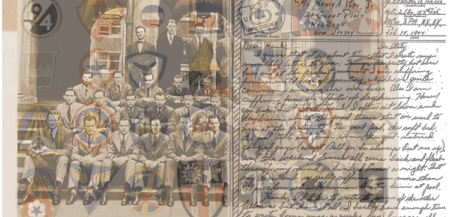
The 70 members of Sigma Phi Epsilon fraternity who went to fight in World War II wrote hundreds of letters for The Delta Pen, a newsletter created by Henry A. Pope W’43. A new book collects some of them.
By Patrick Brugh
Plus | An excerpt from Brothers in War: 1943-1945
They lived in the same house, laughed in the same house, and were brothers in the same house. But when war threatened America, their government called them to combat the fascist Axis, and they were scattered around the world. They left their house almost empty; in fact, it was temporarily closed by the University, until renewed recruitment by alumni on campus and a merger with other Philadelphia chapters of Sigma Phi Epsilon (SigEp) bolstered the numbers enough to fill 3909 Spruce Street once again. But while 70 SigEp fraternity men served on three different continents, one brother, Henry A. “Hank” Pope Jr. W’43, was kept out of the fight by a medical disqualification.
Rather than sit idly by as his brothers battled across Europe, flew bombing missions over the Vaterland, and hopped island to island through the Pacific theater, Pope decided to track down each Quaker by mail and begin a correspondence. He then distilled their adventures, misadventures, and impatience into a newsletter, The Delta Pen, which he mailed abroad to his brothers in the war. He signed-off each issue with a reminder of hope: “Remember the reunion. First and second Cornell games after the war.”
This fall, Polyglot Press, Inc. (www.polyglotpress.com) published a collection of the letters, edited by Brett R. Danko C’90, a SigEp brother who heads the Pennsylvania Delta Chapter SigEp Foundation, and J. Stuart Freeman.
“In 2001 I was going to retire,” recalls Freeman over lunch at the White Dog Café. A longtime editor of medical journals, Freeman was a history major at the University of Virginia, served in the Korean War and began his career as an editor at The Herald Tribune in Paris. He also had vivid memories of watching World War II newsreels as a boy. A colleague introduced him to Danko—who had heard about the letters from another alumnus and wanted to turn them into a book.
While digging through some of his old knick-knacks, Pope’s wife, Elaine, had stumbled across the SigEp brothers’ correspondence. Danko, also a history major, visited and interviewed Pope, and collected and photocopied the nearly 800 letters the brothers had written to the Delta Pen during the War. He contacted each of the brothers, ultimately bringing them together in November 2000 for the dedication of a plaque at the SigEp chapter house at Penn, now located on 40th and Walnut streets.
Danko asked Freeman to edit the letters into a book, and Freeman signed on pro bono. Upon his retirement in January 2001, he hopped onto a container ship with his wife and sailed to Barcelona, taking along more than 1,500 photocopied pages, which he thumbed through on the journey, marking in red sections he thought he could use.
Freeman views the book as a testament to the men of this generation. “One moment they’re sitting at 3909, and suddenly we’re in World War II,” he says. “The incredible thing is taking ordinary guys from Penn and putting them up against—you know—Hitler’s Panzer division. And they win! These guys from SigEp were what the English called ‘Hardys’. They were the backbone of the American forces.”
The letters also testify to the brothers’ resilience in battle. “One man is in the middle of the Battle of the Bulge. You’re cold, you don’t know when you’ll get your next meal, and you could die any minute, but you write a letter to Henry about how you hope [the fraternity’s] rush is going well, and you can’t wait to watch the Penn-Cornell football game?”
Freeman, a Phi Sigma Kappa brother at UVA, marveled at the concern the men had for each other, as well as their unquestioning acceptance of their duty to country. “This really speaks to the value of the fraternity system,” he says.
Brett Danko echoes this sentiment. “[The book] shows a togetherness and community that existed at Penn. It shows brotherhood at its best. It provides insight into the hearts and minds of Penn guys during World War II.”
In most cases, Danko says, the letters that survive are those “to loved ones that say, ‘Everything is great. I love you, mwah, mwah, mwah.’ These letters aren’t about that. They were over there looking for women and booze like every 20-year-old. They would fight afterwards, but they were telling their buddies about the real stuff they did,” he says.
As you skim through the letters, it becomes apparent that many of the men who went to war not only did it without floundering; they liked it.
Reese “Bill” Lindsay, who joined SigEp in 1939, has only one piece of correspondence included, yet his contribution expresses such a depth of excitement that it nearly takes center stage.
“Flying is the best there is!” he writes, “Don’t know why I ever wasted my time getting drunk and going to beer brawls (and school).”
But Lindsay’s letter steals the spotlight not only because of his extraordinary animation; in July of 1944, his plane went down during a bombing raid over Germany. He was officially declared missing in action, and his brothers hoped in letter after letter that he would turn up. By the end of the war, though, his name appeared on the “blacklist” of soldiers killed in action. As the brothers got word that Bill was indeed dead, the tone of the letters changed from hope to sadness.
The book is dedicated to the five SigEp members who lost their lives in the war. Among them, Lindsay and Kenneth Wicker, who joined SigEp two years after Lindsay and even mentions him in his last letter, contribute correspondence to the book.
Wicker, who served as a private first class, would die in Italy nine days after writing his final “monthly letter.” But thanks to a SigEp brother more than a half-century removed from his death and a veteran editor who took the time to have those words printed and bound, his letters will live on, along with those of his brothers in war.
Patrick Brugh C’05 is a work-study student at the Gazette.
EXCERPT
Brothers in War: 1943-1945

Edited by Brett R. Danko C’90 and J. Stuart Freeman
Polyglot Press, Inc., 2004. $30.00
“Flying is the Best There is!”
Reese W. Lindsay (Joined SigEp 1939)
October, 1943 [Greenwood, Mississippi]
You have my latest address from the envelope. It changes every 60 days—as we move on to the next phase of flight training. Above is a picture of the ships we’re using right now. They’re classy jobs, but after November 1st we’ll be in P-36’s and P-40’s, which are only one step from combat! Around Christmas time it’ll be “Lieutenant Lindsay,” if all goes well. I’ve been in training for six months.
I’ve heard news from no one but Charlie Wolf, and am familiar with his travels. However, to keep from getting lonesome, I’ve had to get acquainted with a few hundred of the local damsels.
Flying is the best there is! Don’t know why I ever wasted my time getting drunk and going to beer brawls (and school) when I could have been getting up at 5:30 every day and retiring at 9:30, also every day!
You’ll probably be able to strain something of general interest out of this to put in The Delta Pen. As you can see, we’re a wild bunch of damn fools who are having the time of our lives! Enough for now.
“Our Talk Often Runs to Things Back Home”
Stanley Mason (Joined SigEp 1940)
October 23, 1943 [Fort Benning, Georgia]
Perhaps you’d be interested to know something of what we do here in OCS. Our work so far has been chiefly with weapons, although we have had lectures on hygiene, sanitation, First Aid, automotive maintenance, organization and supply … The classes sit in bleachers like a football stand and the instructor speaks over a public address system hooked up in a jeep. That isn’t the most outstanding difference between this school and college, however … Here a lecture is always accompanied by charts and pictures and usually a demonstration of some sort followed by practical work in which the candidate repeats the work covered himself. I’ve found it very stimulating and always interesting, but needless to say very tiring and somewhat nerve wracking.
Like all men in the Army our talk often runs to things back home, and with us college boys often to college. Here a great deal depends upon ability to be forceful and dependable and above all get along with one’s fellow candidates, for each man rates the men in his squad on efficiency, judgment, tact, etc.
Chet Prentice, Warren Monsees, Don Ziegler and myself are holding up the SigEp name here. They are doing well, better than I, I think. They are through looking for officers now, and anyone that gets through here has earned his bars twice over. If I make it, Sigma Phi Epsilon and the men behind it will have contributed in a large measure. Perhaps there will be a day when I can help out the house. I hope so. In the meantime my heart is still with the fraternity and its ideals.
August 20, 1944 [Somewhere in England]
Received the Delta Pen day before yesterday and certainly did enjoy hearing about the boys—all except brothers Wicker, Brown and Knight. I sure wish news [like that] didn’t have to be printed. Wick’s death is a blow to us all, especially to Bob Hausman and myself who visited Wick’s hometown back in 1942 and met his folks and saw how proud the whole town was of him…
November, 1944 [Somewhere in France]
I got the November Delta Pen today and thought it was the best issue to date. Reading about the boys and what they are doing and how things are back at 3909 does more than most things to chase the mud and rain away and bring out thoughts of the old days … Sorry to hear about Bill Lindsay but some way I feel that he’ll be there at the Cornell reunion too.
This letter finds me completing a rest period here in France and a return to the front in the near future. Things remain rather quiet here in this sector with occasional artillery and a lot of patrolling … We keep the wine flowing, and cognac, too, but you ought to try this Calvados. The boys tell me it’s like a good corn liquor, but all I know is it packs a wallop like a mule …
I’m still leading a rifle platoon, but we’ve given a good account of ourselves against these “Krauts,” as we call them. Some way I believe [the] next Cornell game will find us back together again around the banquet table and hashing over these days we’ve spent away from the old USA.
March 14, 1945 [Hospital in England]
… I just got caught when my luck ran out standing too close to a MarkVI tank shell. I got a few holes in the arm, shoulder, and a crease in the scalp, and I was lucky to get out alive at that. I got a trip to the U.K. in the bargain. The arm is healing up and so is the head…
June 30, 1945 [Czechoslovakia]
I’m back with my division again and am in Czechoslovakia just at the present.
I was pleased to see in SigEp’s journal that Elmer Gray is back home. Here’s hoping Bill [Lindsay] will turn up too.
“There Are More Women Over Here Than You Can Shake a Stick At”
Henry Fulton “Steamboat” Murphy (Joined SigEp 1939)
November 15, 1943 [Somewhere in England, V-Mail]
… I went to flying school, as I guess you remembered, but washed out and now here I am in jolly old England [having] a pretty good time. There are more women over here than you can shake a stick at, and you don’t have any trouble getting dates. Also there is plenty of beer, but it is not like ours. It is much weaker and therefore you have to drink more of it. There are a few places if you know them where you can get all the scotch, gin, and rum you want, but that stuff known as bourbon is not to be had …
I have been going with a little Russian girl here for the past few months. She came over here in 1939 from Latvia and has been here ever since. She got married in ’41 and has been trying to get a divorce ever since. I think that it is coming through next month. She is a lot of fun and she is quite on the beam …
You would get quite a kick out of dating these British girls because it is really something quite different from dating American girls. I certainly do wish that [I] were in California with Frank, because that is really a wonderful place and [there are] more women there than anywhere at home, I believe.
January 21, 1944 [V-Mail]
Every time we have Spam here I am always reminded of you and your saying how much you liked it. Well, if you were over here I have an idea that you would be pretty well burned out of liking the stuff. We have it every way from creamed on down and then start back up again.
February 26, 1944 [V-Mail]
We had a party last night that reminded me a lot of the good old parties we used to have in our room after the football games. We really had a lot of fun and plenty to drink. I had this little red head that my First Sergeant introduced me to. Have had quite a few dates with her. The little Russian was not here, and I got to dance and chat with her. However, her date didn’t like it too much when I kept cutting in on him.
Guess what? We had some snow last night. First time I have seen any since I have been here. Was really beautiful and [I] only wish that we had a little more of it …
I guess that it will have to be almost a reunion of our children that we are planning on having at Penn if they don’t hurry up and get this over with. I have hope of getting home by Xmas 1945, but then you never can tell.
“The War Over Here Is in the Last Lap”
Donald S. Ziegler (Joined SigEp 1940)
February 1944
We are waiting for the maneuver period to start February 7 through April 7. As we are attached to the 4th Army, a Pacific coast replacement outfit, I’ll be bringing back a pair of Jap officer’s swords for the mantle.
I enjoy the hell out of each issue of your monthly scoop.
You know I was home from January 8 to January 16, and the only SigEp I could find was Kent. I was disappointed to miss the initiation party, but I didn’t know anything about it.
As compared with Missouri this place is much warmer but no bed of roses either. I’m now in the land of mud and swamps.
By the way, I have my date for the reunion. Let’s not make it any later than ’45 or we’ll all be old men.
March 8, 1945 [Somewhere in Germany]
I have finally rejoined my outfit after a trek through Wales, England, France, Holland and finally the “Fatherland.” One item of mail I was eagerly waiting to see was Delta Pen. The December issue was on hand and it was like getting news from home. I wish all the old boys would drop you a line because there are some I would like to read about …
April 16, 1945 [Somewhere in Germany]
The war over here is in the last lap and all we have to do is go to the Pacific and clean that up. None of the other boys in the divisions over here are in the same Army as I am, so I guess it will have to be that Penn-Cornell game in 1946 or 1947 before I can give the handshake. Hope you are well and keep up the good work.
May 21, 1945 [Werdohl, Germany]
… The history of the 75th Infantry Division in this theater of global war can be summed up in three places. We left in October, landed at Wales in December. Left England for Le Havre in December and [were] moved right to the front. The division was first committed against von Rundstedt’s great offensive in Belgium. When he started retreating we were shifted to the Colmar pocket and pushed the Jerries back. We wound up our part of the war by cleaning out the Ruhr pocket. We were in the First, Third, Seventh, and Ninth armies and attached to the French First and British Second. Hell, nobody wanted us! Seriously, though, we did a pretty good job for a green outfit but suffered heavy casualties in Belgium …
July 17, 1945 [Suippes, France]
The black market in Paris is all that you hear. $14.00 for a carton of cigarettes, $1.00 for soap, $0.50 for gum and candy. On the other hand champagne goes at $8.00 a fifth and women—it’s rougher than London’s Picadilly’s Circus, or anything you can imagine! …
Keep us informed on the latest about Bill Lindsay, and I sincerely hope he came through all right.
… I wish all our brothers success on the Pacific side of the States, and we’ll be over there to throw some weight against the Japs.
October 16, 1945 [Moormelon, France]
I saw a good football [game] yesterday—believe it or not, an all-GI affair between Oise Intermediate Section (my team) and Bremen Port Command. We won 14 to 0. An oddity is that each team was made up more or less equally of blacks and whites and there were no penalties or dirty playing. Something never seen in the democratic USA.
Things in general are pretty quiet over here except everybody is crying—“When do we get home?” …
“Until I See You and a Lot of the Rest of the Gang, Be Good”
George G. Ziegler (Joined SigEp 1940)
January 17, 1944 [Frederick, Oklahoma]
Even after Lindsay’s warnings and admonitions I asked for twin engine Advanced and got it. There are both AT-9’s and AT-17’s at this field, but most of us fly the latter since there is a preponderance thereof. It is an ugly looking conglomeration of wings, motors and fuselage, but I kind of enjoy flying it (after a grand total of 1 hours!). I’m having a time of it getting used to a wheel and having such things as throttles, mixture, prop controls, etc., on my right. And the cockpit procedures like to drive me crazy. After I solo I’ll start worrying about the grueling instrument course that Lt. Reese W. [Lindsay] told me about. Well—it’s got to be something.
You may be interested to know that through the Delta Pen as an intermediary, I hold letters from Lindsay, Pontin, Dove, Ziegler (D.S.), and cards from others …
October 23, 1944
… You had Lindsay on your blacklist. Now you may have more information about him than I do and more authoritative, but here’s what I know. He was among the fraternity brothers over here that I tried to contact some time ago, and on August 21 I wrote him a letter. A few days ago that letter was returned to me …
I had addressed it to Lt. R. William Lindsay 0819552. Someone had made a check mark in red ink over each item of the name and another over the word “missing.” They had even written in “Reese” above the “R,” so it looks like they were checking it thoroughly.
This, of course, is not substantial enough to use as the basis for announcing that Bill is MIA, but a few discreet inquiries seem called for. If Bill is actually missing, you doubtless have heard of it long since. I thought I’d let you know, just in case.
December 13, 1944
… I don’t at all like the sound of the report on Bill Lindsay. Knowing for a fact that the pilot and co-pilot can’t get out till last, the statement that only four got out doesn’t sound so good. However, if only four chutes were seen to open, there is a good chance that the rest were delayed openings and therefore simply not observed by other aircraft. But here’s hoping for the best!
October 6, 1945 [San Angelo, Texas]
… The official announcement of Bill Lindsay’s death was, although expected, a bitter blow. We all know what a grievous loss we have suffered. As you say, it is our duty to see that Bill and the others did not die in vain.
Until I see you and a lot of the rest of the gang, be good.




